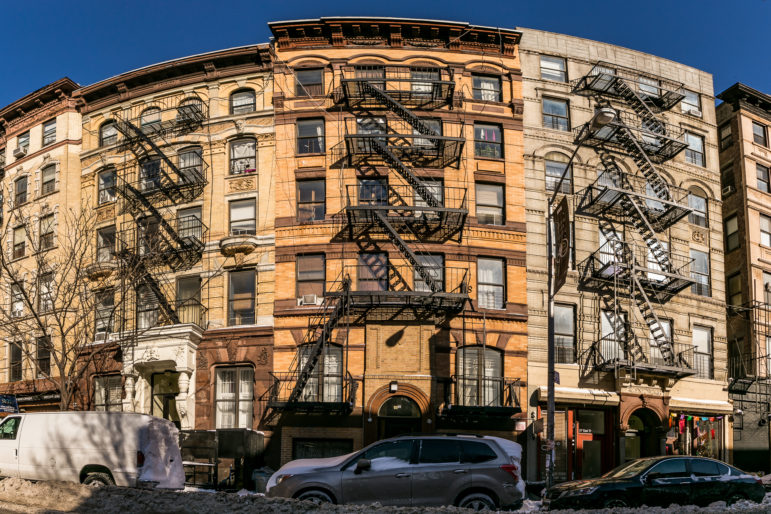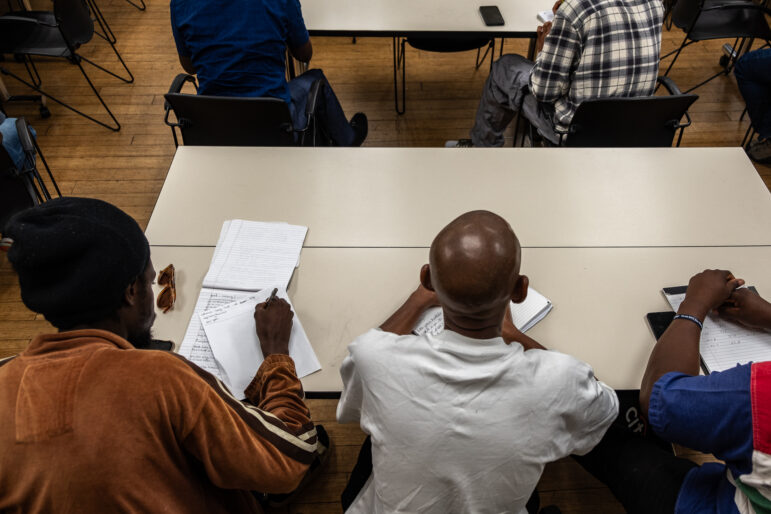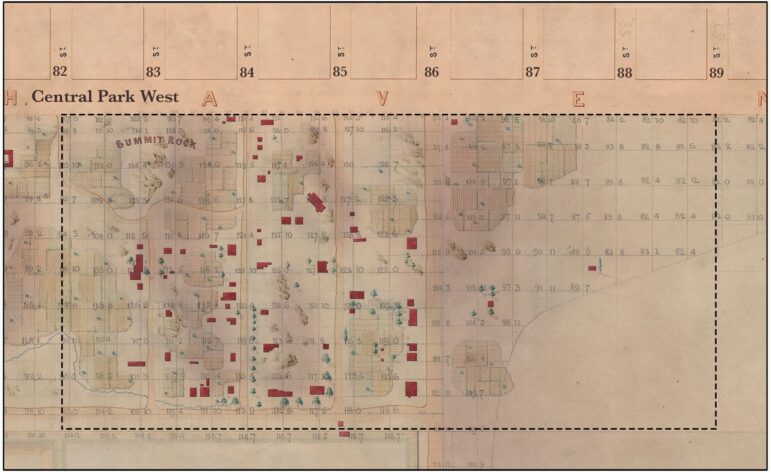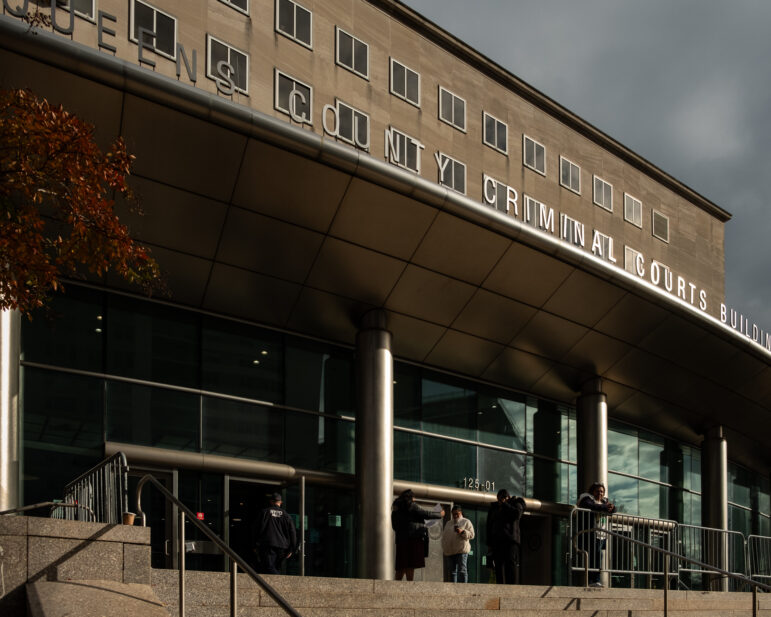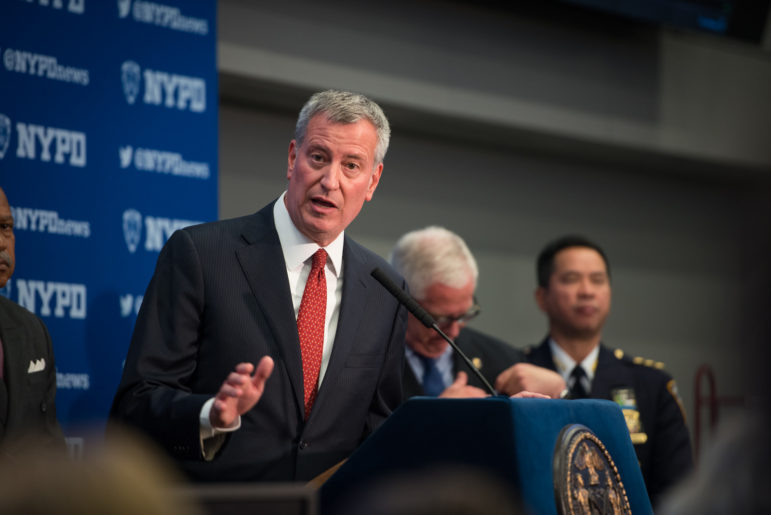
Mayoral Photography Office
Mayor de Blasio (file photo) was faulted for his late 2014 comments about concerns regarding a potential encounter between his son and the police.
Monday night’s debate between Public Advocate Letitia James, the Democratic incumbent, and J.C. Polanco, her Republican challenger, was notable for its substantive exchanges and friendly yet competitive air. The differences between the two leading candidates in the November 7 election for the city’s No. 2 post are clear, and their points of agreement (on, say, skepticism about the mayor’s plan to build 90 new homeless shelters) are instructive.
In fact, the harshest word in the debate was used in a claim about a candidate who wasn’t even in the room. At about the 27:50 mark in the event (which can be viewed here), Polanco—answering a question about how he’d approach criminal justice issues if elected—accused Mayor de Blasio of slurring New York City police officers:
“A couple of years ago the NYPD was under incredible pressures across the city where so many of our residents had turned on them and so many elected officials did as well. I remember Tish James being completely silent as this mayor referred to our cops as bigots and how he had to have special conversations with his child when he deals with the police as if our cops are racist and they’re acting out their unjust racist instincts. And this hurt a lot of officers and it hurt me a great deal because I’ve been a teacher for so many of them at CUNY, and they dedicated their lives. They put their lives on the line. And here you have a mayor to make that kind of claim. No wonder that these police officers turned their back on them. When they come and respond to a call, they don’t ask if you’re Black or Hispanic. They want to protect us. And to make sure that we are safe.
WNYC’s Brian Lehrer, who co-hosted the debate with Spectrum NY1’s Errol Louis, followed up: Did the mayor actually call cops “bigots”? Polano replied:
Brian, I was clear: “referred” to them as such—meaning, that when he said he had to have special conversations with his son because ‘you know how those cops are,’ you don’t have to be a rocket scientist to know exactly what he’s telling the people of the city of New York about what he thinks of police officers.
The basis
Polanco was evidently referring to the comments de Blasio made on December 3, 2014 shortly after Staten Island District Attorney Daniel Donovan announced that a grand jury had decided not to indict Office Daniel Pantaleo, the cop who threw his arm around Eric Garner’s neck during the takedown that caused Garner’s death the previous July.
The mayor’s comments drew instant condemnation from police unions and figured prominently in the anger officers expressed toward the mayor after the slaying of officers Wen Jian Liu and Rafael Ramos in Brooklyn later that month. They are probably the most scrutinized remarks de Blasio has ever made.
Here are the relevant parts of what the mayor said that day. The excerpt is lengthy because he develops the theme that many found offensive over the course of several passages (you can also read the full transcript or watch the video):
I spent some time with Ben Garner, Eric’s father, who is in unspeakable pain. … I couldn’t help but immediately think what it would mean to me to lose Dante. Life could never be the same thereafter, and I could feel how it will never be whole again – things will never be whole again for Mr. Garner. …
And the tragedy is personal to this family, but it’s become something personal to so many of us. It’s put in stark perspective the relationship between police and community. This issue has come to the fore again, and we have to address them with all our might. We can’t stop. We have to act, with the assumption that it’s all of our jobs to never have a tragedy again – that’s what we have to fight for.
This is profoundly personal for me. I was at the White House the other day, and the President of the United States turned to me, and he met Dante a few months ago, and he said that Dante reminded him of what he looked like as a teenager. And he said, I know you see this crisis through a very personal lens. I said to him I did. Because Chirlane and I have had to talk to Dante for years, about the dangers he may face. A good young man, a law-abiding young man, who would never think to do anything wrong, and yet, because of a history that still hangs over us, the dangers he may face – we’ve had to literally train him, as families have all over this city for decades, in how to take special care in any encounter he has with the police officers who are there to protect him.
And that painful sense of contradiction that our young people see first – that our police are here to protect us, and we honor that, and at the same time, there’s a history we have to overcome, because for so many of our young people, there’s a fear. And for so many of our families, there’s a fear. So I’ve had to worry, over the years, Chirlane’s had to worry – was Dante safe each night? There are so many families in this city who feel that each and every night – is my child safe? And not just from some of the painful realities – crime and violence in some of our neighborhoods – but are they safe from the very people they want to have faith in as their protectors? That’s the reality. And it conforms to something bigger that you’ve heard come out in the protests in Ferguson, and all over the country.
… Because, as I said the other day, we’re not just dealing with a problem in 2014, we’re not dealing with years of racism leading up to it, or decades of racism – we are dealing with centuries of racism that have brought us to this day. That is how profound the crisis is.
… And I remind you, my faith in Commissioner Bratton is based on the actions he has taken over decades and it is also based on the clarity of his message to all of us. He gathered his top commanders a few weeks ago. It was well-reported. He said very publicly, the department will act aggressively to ensure any officer who is not meant to be in this work no longer is. He talked about those who don’t live up to the values of the uniform, who have “brutal”, who are “corrupt”, who are “racist”, who are “incompetent”. This was our police commissioner making clear his standard that people who sadly fit those descriptions would not be members of the NYPD.
The breakdown
The potential for a devastating encounter between their child and the police is a genuine concern for some parents—it has been for decades, and not just in New York. The NAACP was producing a pamphlet called “the law and you” to help Black parents talk to their kids as early as 1999.
Like his predecessor Mayor Bloomberg, who after the deaths of Alberta Spruill and Sean Bell very quickly acknowledged the likelihood of wrongdoing by the police department, de Blasio was clearly trying to avoid leaving the city’s Black population feeling alienated after the grand jury decision. De Blasio, evidently worried that there would be violence (which would, after all, put cops and others in danger), seemed to be trying to give people a sense that government would address the source of their fear and anger. And the mayor was reacting quickly, because he had to.
That said, there was a striking lack of acknowledgement in de Blasio’s remarks of the size and diversity of the police department, the fact that the majority of cops do not perform chokeholds, the courage and dedication many NYPD members show daily or the complicity of elected officials in creating the enforcement regimes that create cop-community friction in many areas of the city. As City Limits reported this week, even some police critics believe de Blasio erred in suggesting that his primary relationship with the NYPD was not that of a mayor who oversees the agency in its mission to keep New Yorkers safe, but rather that of a parent frightened about harm coming to his son.
All that is to say that it is a stretch to say that de Blasio “referred” to cops as “bigots.” If one wants to argue that the mayor implied as much (and an implication is different from a reference), one would also have to see an implication in de Blasio’s remarks that not all cops are bigots—namely, the passage about Bratton’s pledge to root out the NYPD’s bad apples. And the references to the deeper history of racism imply de Blasio was talking about more than just an NYPD problem, although it is true the mayor did not articulate that.
In retrospect, the mayor’s remarks look poorly worded – but so does Polanco’s depiction of them.
The broader discussion
The comment about de Blasio notwithstanding, the exchange between the candidates illustrated a real disagreement on policy.
Polanco ended his initial comments on the NYPD by saying: “Obviously I feel that it’s very important that police feel as though they are appreciated in this city. And we can do two things: We can build police-community relations. We can make sure that the police are very well-trained when it comes to multicultural differences. But frankly this city has gone through an enormous political campaign against police, including adding all these layers and layers of actually monitoring of their job performance which really strangles them from police from active policing.”
For her part, James rejected Polanco’s assertion that she had been silent on the issue:
“I’ve been at the funeral of every police officer that unfortunately has been murdered since I’ve been public advocate of the city of New York. I’ve stood with them at the hospital,” she said. “My sister is a retired detective and so I do not take for granted the hard work of the NYPD and I salute them because they are heroes and she-roes. That’s being said, there’s a need for some accountability.”
James said she had pushed de Blasio for better disclosure of police disciplinary records. But she would only say she was “reviewing” the Right to Know Act, which has been on the table since early 2014, to determine whether to support it.


